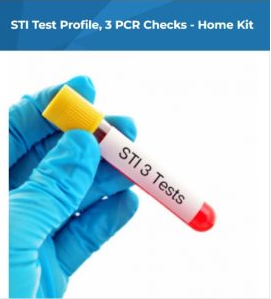The discovery of STI testing has changed the boundaries of diagnostic tools in sexual infections. The Herpes test is another tool that is helpful for the detection of herpes infection, which HSV causes. Its discovery has revolutionized the way we diagnose this infection.
In this article, we will explore the discovery of these exams and discuss their importance.
The Need for Accurate Diagnosis of STIs
STIs, also known as sexually transmitted diseases, are infections that primarily spread through sexual contact. These common infections include chlamydia, gonorrhea, syphilis, HPV, and HIV/AIDS.
Correct diagnosis of these infections is necessary for several reasons:
- Timely Treatment: Early results allow medical professionals to prescribe proper medications, treatments, or other exams to treat the infection properly. Furthermore, early treatment can help lessen symptoms, prevent problems, and reduce the risk of transmitting the infection to others.
- Preventing the Spread: Knowing one’s STI status is crucial for preventing the spread of infections to sexual partners. With a confirmed diagnosis, individuals can take necessary precautions, such as practicing safe sex, informing their partners, and seeking treatment, to lessen the spread of risk.
- Health Monitoring: For certain infections, such as HIV/AIDS, regular monitoring helps monitor the growth of infection and the effect of treatment and medicine. It allows doctors to adjust the treatment plan and provide appropriate care to manage the infection effectively.
The Discovery of STI Tests
The discovery of these exams has significantly improved the diagnosis and management of these infections. Instead of relying solely on symptoms or physical examinations, the medical team can now use specialized exams to detect the presence of sexual infections.

Types of STI Tests
- Nucleic Acid Amplification Exam (NAATs): NAATs are highly sensitive and specific exams that detect the genetic material (DNA or RNA) of the STI-causing microorganism. These exams can identify the presence of infections, even with no visible symptoms. NAATs are commonly used for the diagnosis of chlamydia and gonorrhea.
- Serological Exams: Serological exams involve analyzing blood samples to detect the presence of antibodies produced by the immune system in response to a sexual infection. These exams commonly diagnose viral infections like HIV/AIDS and syphilis. Serological exams can help determine whether a person has been exposed to a specific sexual infection.
- Point-of-Care Exams: Rapid diagnostic examinations provide immediate results, often within minutes. They are particularly useful when quick diagnosis and treatment initiation is critical. They are available for sexually transmitted infections, including HIV, syphilis, and certain bacterial infections.
The Significance of STI Tests
The discovery of this exam has significant implications for the sexual health of individuals. These exams enable early detection of infections, even without symptoms. Furthermore, early diagnosis allows for timely treatment, preventing the progression of the infection and reducing the risk of complications. In addition, accurate diagnosis through these exams ensures that individuals receive appropriate treatment tailored to the specific infection. Targeted treatment helps manage the infection effectively, alleviate symptoms, and reduce the risk of long-term complications.
Therefore, the availability of these exams plays a crucial role in public health initiatives. Early detection and treatment help reduce spread rates, control spread, and improve sexual health.
The Need for Accurate Diagnosis of Herpes
Herpes is a viral infection that primarily affects the skin and mucous membranes. It is transmitted through direct contact with an infected person, particularly during sexual activity or close personal contact. This infection can cause outbreaks of painful blisters or sores on the affected area, such as the genitals or mouth. After the initial infection, the virus remains in the body and can cause recurrent outbreaks throughout a person’s life.
Accurate diagnosis of HSV Virus is crucial for several reasons:
- Effective Treatment: Proper diagnosis allows doctors and medical professionals to prescribe antiviral medications to manage the infection. These medications can help alleviate symptoms, reduce the duration of outbreaks, and prevent the spread of the virus to others.
- Preventing the Spread: Knowing one’s herpes status is necessary for preventing the spread of the virus to other sexual partners. Therefore, with a confirmed diagnosis, individuals can take necessary precautions, such as practicing safe sex and using barrier methods like condoms, to lessen the spread of risk.
- Psychological Well-being: HSV virus can greatly impact the health of individuals, leading to feelings of shame and stigma. Furthermore, emotional distress can also attract the patient. A clear diagnosis helps individuals understand their condition, access support networks, and seek appropriate counseling or psychological support to cope with the emotional aspects of living with the HSV virus.
The Discovery of the Herpes Test
The discovery of this exam has changed the diagnostic landscape of this infection. Instead of relying solely on visible symptoms or medical results, medical workers and doctors can now use lab exams to detect the presence of the HSV virus in the body.
Types of Herpes Exams
- Viral Culture: A sore or blister sample is taken to a lab for analysis in this exam. Lab workers examine the sample to see the HSV virus’s growth. Viral culture is most effective when done during an active outbreak.
- Polymerase Chain Reaction (PCR): PCR is a highly sensitive and specific exam that detects the genetic material of the virus. It can identify the presence of the virus even when there are no visible symptoms or during periods of latency. PCR is typically performed on a sample of fluid or tissue from the affected area.
- Blood Exams: They check for antibodies of virus in the blood. The immune system produces these antibodies in response to the infection. Blood exams can determine if a person has been previously infected with HSV, even if they have no active symptoms during screening.
Significance of the Herpes Test
The discovery of this exam holds significant implications for individuals affected by this infection. It allows for early detection of the infection, even without visible symptoms. In contrast, this early diagnosis enables timely intervention, management, and the start of antiviral treatment if necessary. It also confirms a suspected HSV infection and removes any type of doubt. Furthermore, it allows individuals to understand their condition in a better way. It helps distinguish HSV from similar conditions and guides medical professionals or doctors in giving proper care and support.

A confirmed diagnosis enables individuals to take necessary measures to prevent the spread of the virus to others. It also creates an opportunity for education, where individuals can learn about safe sex practices, disclosure plans, and resources for managing the infection.
Conclusion
The discovery of STI tests has changed the field of sexual health diagnosis, offering more correct and fast methods to detect and manage sexually spreading infections. These exams allow for early detection, targeted treatment, prevention of spread, and improved overall sexual health results. On the other hand, the herpes test discovery has brought about a significant breakthrough in diagnosing the HSV virus. With the availability of lab exams, medical professionals and doctors can accurately detect this virus in the body, leading to effective treatment, prevention of spread, and improved psychological well-being for individuals living with this infection.
Therefore, early diagnosis, proper management, and support networks contribute to a better quality of life for those affected by these infections.

